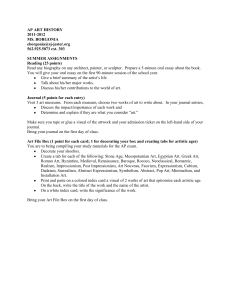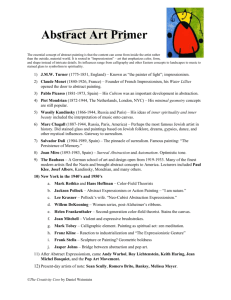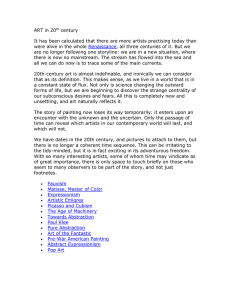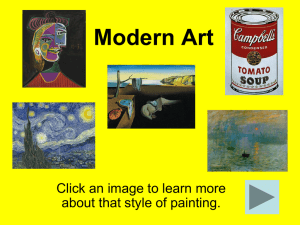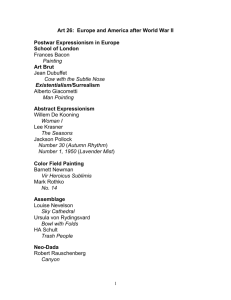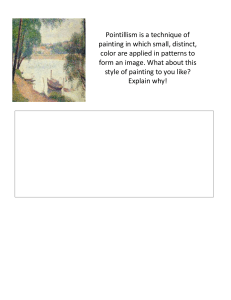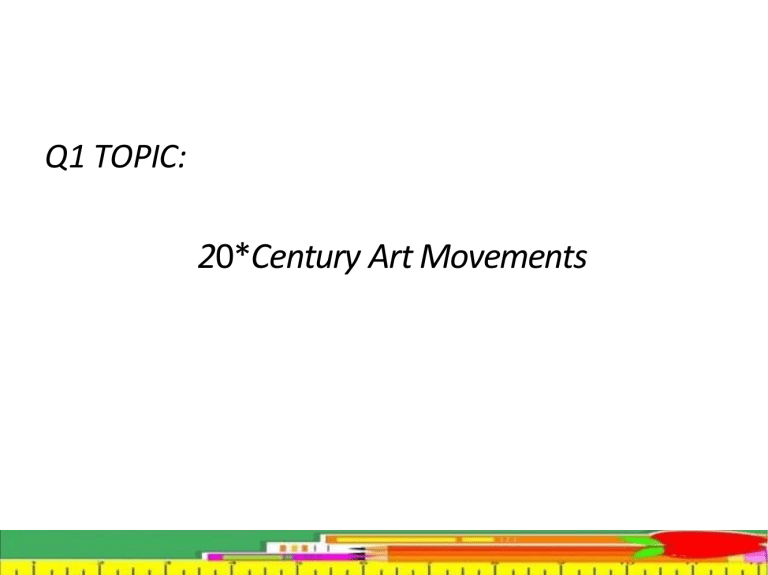
Q1 TOPIC: 20*Century Art Movements 20 Century Art Movements: 1.Impressionism 3. Expressionism 3.Abstractionism 4. Abstract Expressionism 5. Contemporary Art Forms ANALYSIS Guide Question: Describe how your group classified/paired the pictures. What was your basis in grouping the pictures of the art works? IMPRESSIONISM Distinct Characteristics: 1. Color and Light - Short broken strokes Pure unmixed colors side by side - Freely brushed colors (convey visual effect) IMPRESSIONISM Distinct Characteristics: 2. Everyday Subjects Scenes of life Household objects - Landscapes and Seascapes Houses, Cafes, Buildings IMPRESSIONISM Distinct Characteristics: 3. Painting Outdoors Previously, still lifes, portraits, and landscapes were painted inside the studio. The impressionists found that they could best capture the ever-changing effects of light on color by painting outdoors in natural IMPRESSIONISM Distinct Characteristics: 4. Open Composition Impressionist painting also moved away from the formal, structured approach to placing and positioning their subjects. EXPRESSIONISM (A Bold New Movement) Sub Movements: 1. Fauvism Uses bold, vibrant colors and visual distortions. 2. Dadaism Characterized by dream fantasies, memory images, and visual tricks and fantasies. EXPRESSIONISM (A Bold New Movement) Sub Movements: 3. Surrealism Depicts an illogical subconscious dream world beyond the logical, conscious, physical one. 4. Social Realism Expresses the artist's role in social reform. Persistence of Memory Solvador Dali Guernica Pablo Picasso ABSTRACTION SM Sub Movements: 1. Cubism Artworks were a play of planes and angles on a flat surface. 2. Futurism Arts were created for a fast-paced, machine-propelled age. ABSTRACTION SM Sub Movements: 3. Mechanical Style The result of the futurist movement. Basic forms such as planes, cones, spheres, and cylinders all fit together precisely and neatly in their appointed places. 4. Non-objectivism Do not use figures. ABSTRACTIONISM Three Musicians Pablo Picasso The City Fernand Leger ABSTRACT EXPRESSIONISM Sub Movements: 1. Action Painting The techniques could be splattering, squirting, and dribbling paint with no preplanned design. 2. Color Field Painting Uses different color saturations to create desired effects. Autumn Rhythm Eckson Pollock Abstract No. 2 Lee Krasner POP ART Distinct Characteristics: 1. Range of Work From painting, to posters, collages, 3D assemblages, and installations. 2. Inspirations/Subjects Advertisements, celebrities, billboards,and comic strips. OP ART Distinct Characteristics: 1. A form of action painting with the action taking place in the viewer's eye. 2. As the eye moved over a diff. segments of the image, perfectly stable components appeared to shift back and forth. CONTEMPORARY ART FORMS 1. Installation Art - Uses sculptural materials and other media to modify the viewer's experience in a particular space. - Usually lifesize or even larger. Installation can be constructed in everyday public or private spaces both indoor and outdoor. CONTEMPORARY ART FORMS 2. Performance Art The actions of the performers may constitute work. It can happen any time at any place for any length of time. It may include activities such as theater, dance, music, mime, juggling, and gymnastics. 0 TEMPORARYART Cordillera Labyrinth Roberto Villanueva Sid Gomez Hildawa APPLICATION 1. The participants will be grouped into seven (7). Each group will be assigned to a particular art movement and they will create a sample artwork. Group.• 1. Impressionism 2.Expressionism 3. Abstractionism 4. Abstract Expressionism 5.Pop Art 6. Installation Art 7. Performance Art
